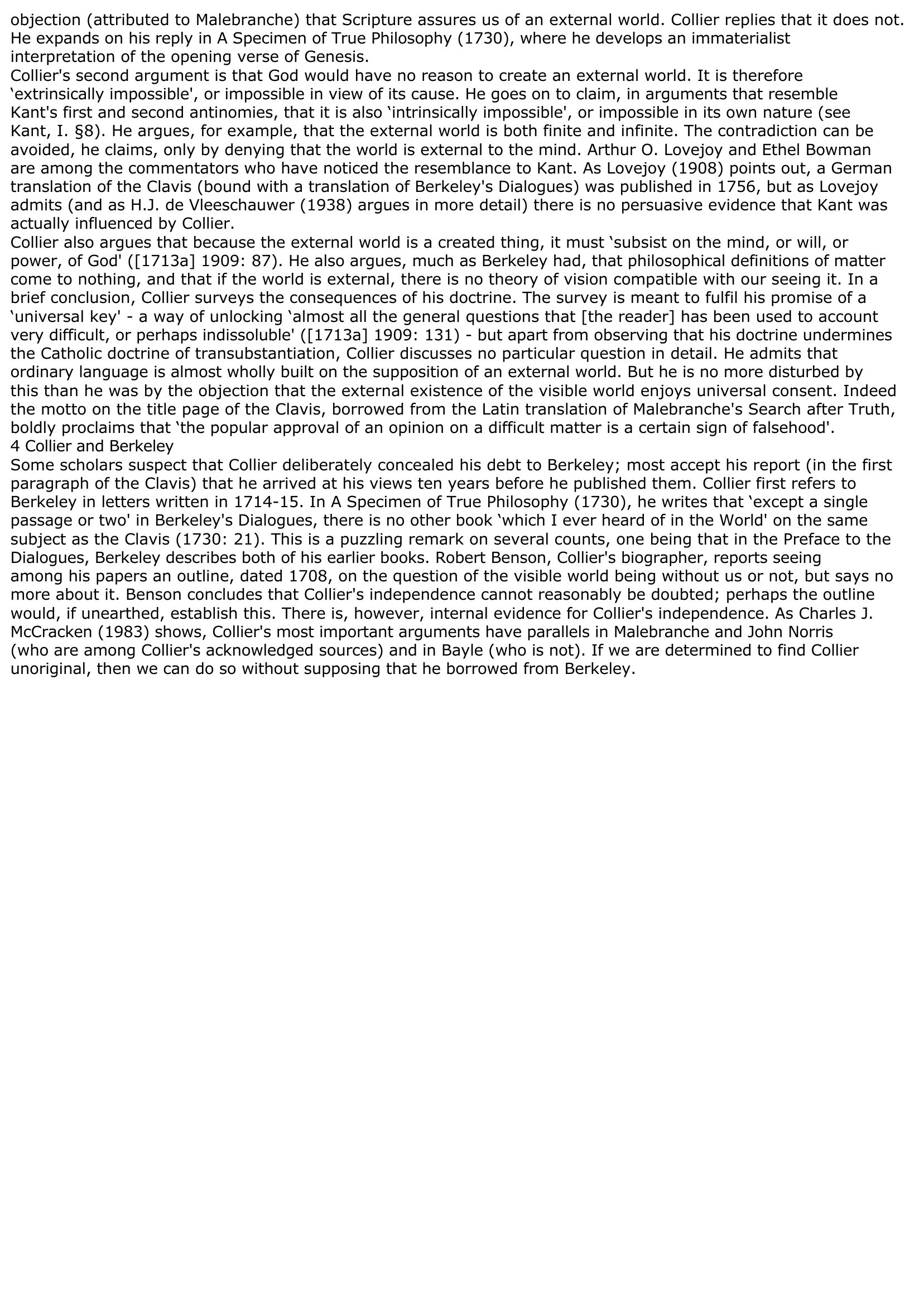Collier, Arthur
Publié le 22/02/2012

Extrait du document
«
objection (attributed to Malebranche) that Scripture assures us of an external world.
Collier replies that it does not.He expands on his reply in A Specimen of True Philosophy (1730), where he develops an immaterialistinterpretation of the opening verse of Genesis.Collier's second argument is that God would have no reason to create an external world.
It is therefore‘extrinsically impossible', or impossible in view of its cause.
He goes on to claim, in arguments that resembleKant's first and second antinomies, that it is also ‘intrinsically impossible', or impossible in its own nature (seeKant, I.
§8).
He argues, for example, that the external world is both finite and infinite.
The contradiction can beavoided, he claims, only by denying that the world is external to the mind.
Arthur O.
Lovejoy and Ethel Bowmanare among the commentators who have noticed the resemblance to Kant.
As Lovejoy (1908) points out, a Germantranslation of the Clavis (bound with a translation of Berkeley's Dialogues) was published in 1756, but as Lovejoyadmits (and as H.J.
de Vleeschauwer (1938) argues in more detail) there is no persuasive evidence that Kant wasactually influenced by Collier.Collier also argues that because the external world is a created thing, it must ‘subsist on the mind, or will, orpower, of God' ([1713a] 1909: 87).
He also argues, much as Berkeley had, that philosophical definitions of mattercome to nothing, and that if the world is external, there is no theory of vision compatible with our seeing it.
In abrief conclusion, Collier surveys the consequences of his doctrine.
The survey is meant to fulfil his promise of a‘universal key' - a way of unlocking ‘almost all the general questions that [the reader] has been used to accountvery difficult, or perhaps indissoluble' ([1713a] 1909: 131) - but apart from observing that his doctrine underminesthe Catholic doctrine of transubstantiation, Collier discusses no particular question in detail.
He admits thatordinary language is almost wholly built on the supposition of an external world.
But he is no more disturbed bythis than he was by the objection that the external existence of the visible world enjoys universal consent.
Indeedthe motto on the title page of the Clavis, borrowed from the Latin translation of Malebranche's Search after Truth,boldly proclaims that ‘the popular approval of an opinion on a difficult matter is a certain sign of falsehood'.4 Collier and BerkeleySome scholars suspect that Collier deliberately concealed his debt to Berkeley; most accept his report (in the firstparagraph of the Clavis) that he arrived at his views ten years before he published them.
Collier first refers toBerkeley in letters written in 1714-15.
In A Specimen of True Philosophy (1730), he writes that ‘except a singlepassage or two' in Berkeley's Dialogues, there is no other book ‘which I ever heard of in the World' on the samesubject as the Clavis (1730: 21).
This is a puzzling remark on several counts, one being that in the Preface to theDialogues, Berkeley describes both of his earlier books.
Robert Benson, Collier's biographer, reports seeingamong his papers an outline, dated 1708, on the question of the visible world being without us or not, but says nomore about it.
Benson concludes that Collier's independence cannot reasonably be doubted; perhaps the outlinewould, if unearthed, establish this.
There is, however, internal evidence for Collier's independence.
As Charles J.McCracken (1983) shows, Collier's most important arguments have parallels in Malebranche and John Norris(who are among Collier's acknowledged sources) and in Bayle (who is not).
If we are determined to find Collierunoriginal, then we can do so without supposing that he borrowed from Berkeley..
»
↓↓↓ APERÇU DU DOCUMENT ↓↓↓
Liens utiles
- Biographie de COLLIER (Arthur).
- Explication linéaire A la Musique Arthur Rimbaud, Poésies, 1870-1871
- Ophélie d’Arthur Rimbaud
- Lecture Analytique 2 : Vénus anadyomène : Arthur Rimbaud
- ARTHUR RIMBAUD – MA BOHEME - analyse

































